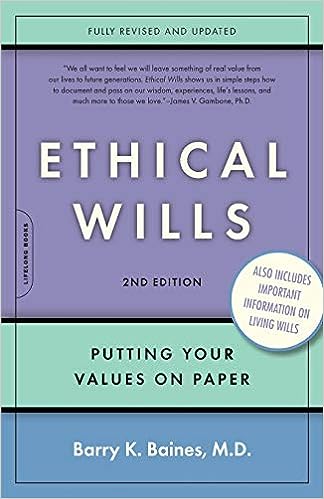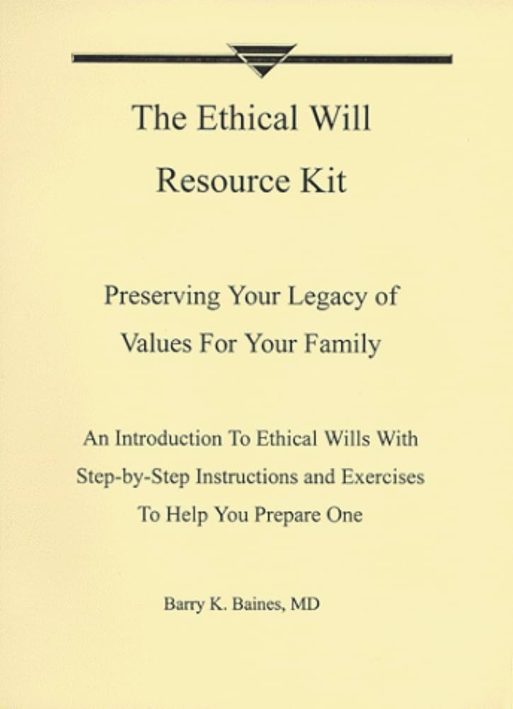
An ethical will is a written record articulating a person’s beliefs, philosophies and life experiences as a legacy for others. While not a legal document, an ethical will can serve as a loving gift for future generations. The book “Ethical Wills: Putting Your Values on Paper” details the who, what, when and how of ethical wills and explains why you should have one in in your life-plan toolbox. As author Barry K. Baines, M.D. states in the foreword to his book, “Ethical wills add meaning, significance, fulfillment and peace of mind to your life and to the lives of your loved ones.”

Writing an ethical will can help you to examine your values and beliefs.
Ethical wills are not a new concept. Initially, these meaningful life testimonies and advice were transmitted orally by elders. The tradition is referenced in both Hebrew and Christian Bibles, and they have also historically been used in cultures throughout the world. Over time, the practice evolved into written documentation. And with the advent of technology, they can also be audio or video recordings. Regardless of the format, they can be shared with family members both while you are living, as well as with succeeding generations once a loved one is gone.
Anyone can offer practical and inspirational advice for people at any stage of life. Whether single or married, young or old, parent or childless, happy or sad – any time is a good time to share your life stories, hopes, dreams, lessons, and/or values with others. An ethical will can also be an opportunity to expound personal family knowledge or history. There is no limit to what you share or how you wish to share it with others.
When to Write an Ethical Will
Baines tells us that an ethical will is a living document that you can start, stop, revisit and rewrite at any time. And you do not need to wait to begin. An ethical will is also a way to think about the values you want to see manifest in your life. Sometimes, life challenges or transitions like the birth of a child, a marriage or divorce, or being diagnosed with a serious illness can cause us to re-examine some of those things. Baines encourages readers to write their ethical will now, then share it, store it, save it, and revise it as warranted.
How to Get Started
Since ideas about what an ethical will might convey can vary widely, it may be difficult to know how or where to begin. Baines offers several starting points to spur thinking and writing or dictating. What resonates best with you is what is most important in creating your ethical will.
One approach is to begin with key phrases or opening thoughts:
I want you to know…
Things I have learned in my life …
As I’ve grown older, I’ve learned…
An important value to cherish is….
Don’t be afraid to…
You might otherwise begin with an outline. This might include things like important events, decisions or milestones. Or you may feel compelled to share ancestral traditions or lessons you’ve learned from previous generations, so these can be readily passed down beyond your lifetime. Sometimes, people even start the process by writing their own eulogy.
For others, it may be easiest to begin from a list of categories:
Relationships
Morals
Teachings
Favorite things
Spirituality / Faith
Humor
Life lessons
Traditions
Hopes
Dreams
Core Beliefs
Thoughts About the Future
The Benefits of an Ethical Will
Baines tells us that writing an ethical will can be an eye-opening experience, whether close to death or not. We can choose to approach it casually or with a sense of urgency. Writing one can be a way to learn about yourself, reflect on your life experiences, affirm what others mean to you, articulate your beliefs, or even come to terms with your mortality. An expression of regrets, apologies or forgiveness may come out of the process. It then becomes something you can choose to share with someone if saying the words aloud would be too difficult. Ultimately, creating an ethical will is about benefiting yourself, as well as others.
Although not legally binding, an ethical will can still be a valuable asset in your life planning toolbox. While a last will and testament is a legal document that provides instructions about what to do with material assets after a person dies, an ethical will bequeaths values to others. And a living will, or advance directive, instructs families to implement healthcare wishes if you can no longer do so for yourself.

“The Ethical Will Resource Kit” offers more history, examples and prompts to help get you started.
But Baines says there are many similarities between a living will and ethical will, as both convey important values and beliefs. Together, they ensure that your wishes and hopes are “on the record,” not to be lost, ignored or forgotten. He writes, “A living will is written to inform the future about what we believe today. An ethical will provides a bridge from the past to the future.” In the book, Baines offers readers additional advice on how to craft a living will, as well.
So whether you decide to approach the process like a writing exercise or dive in open-ended with a blank piece of paper, simply begin. This gift from the heart can mean more to loved ones than any material possessions you might leave behind.
If you need more encouragement, Baines also provides authentic examples of ethical wills written by people from varied backgrounds and ages. And there is an “Ethical Will Resource Kit” available as an adjunct to Baine’s book, as well.

 “Ethical Wills: Putting Your Values on Paper” by Barry K. Baines
“Ethical Wills: Putting Your Values on Paper” by Barry K. Baines


 Debating Medical Aid in Dying
Debating Medical Aid in Dying
 “Help Me, Helen”
“Help Me, Helen”















